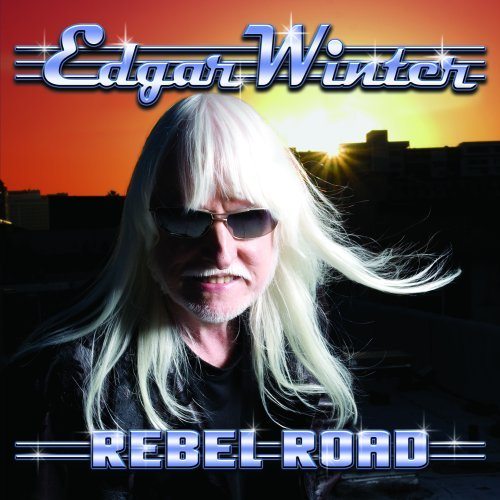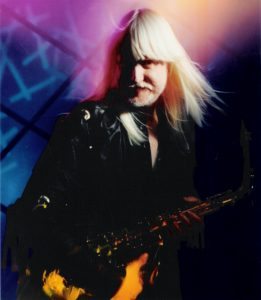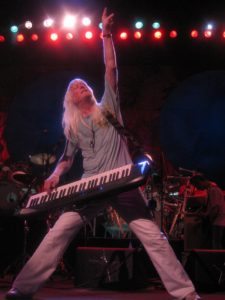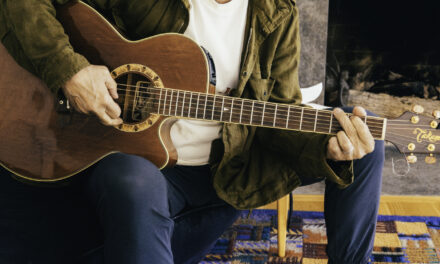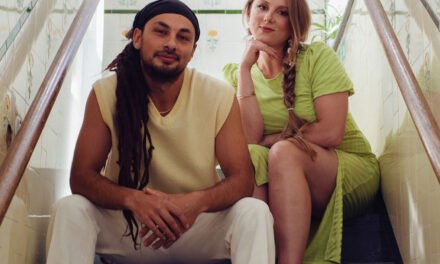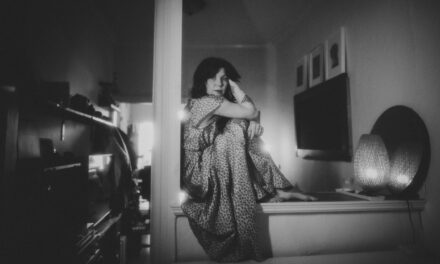Edgar Winter
The US blues rocker is soon to play at KOKO (Dec 1st) and offered a chance to talk with Edgar, our Pete was eager to pitch a number of questions he had always wondered about. Here, Winter, brother of the late great guitar ace Johnny gives detailed responses and a ton of insights – enjoy…..
I learned rock/blues bass from ‘Second Winter’, Edgar – did you guys realise what a classic record in the Johnny Winter canon you were creating? I particularly liked ‘I’m Not Sure’ with the demented harpsichord runs!
The process of recording was so new to me at that time, every minute was magic. I was too immersed in the music itself to consider what historical significance it might have in the future, but I think Johnny did have some sense of that.
I recall the engineer wanting to take a break to watch the moonshot, claiming history was being made. Johnny said something like – Yeah, history’s being made all right, rock ‘n’ roll history. If you’re more interested in walking on the moon than what we’re doing here, you can take a walk yourself. They made up the next day and everything was cool.
By the way, the keyboard on “I’m Not Sure” was an old RMI, the same thing I used on the “Entrance” album. I thought the weird electronic harpsichord sound was a nice complement to Johnny’s mandolin.
What are your memories of recording the Johnny & Edgar Winter set, for Columbia? Is there a lot in the can we never heard?
The hardest part was getting both bands on stage at the same time. Two drummers worked fine, but you couldn’t very well have two bass players, so Dan Hartman ended up playing piano. Everything we played turned out to be old songs we used to do together back in the club days, so the whole thing was very sentimental and nostalgic for me.
For current touring, what keyboards do you take on the road and why?
I use either a Korg M3 or a Yamaha Motif module for organic sounds. I have piano and organ samples converted to the M3 format that work really well live. For the synth sounds (Frankenstein, Free Ride, etc.) I am using a Roland V-Synth module triggered by an Edirol controller via a Kenton wireless transmitter. This is the closest I can come to recreating the original ARP 2600 analogue synth sound with a reliable digital system.
Are the band members from White Trash still around? Are you in touch with them?
Jerry LaCroix (the other lead vocalist, harp, and sax player) passed away in 2014 as a result of a chronic heart condition he had for years. Bobby Ramirez (the drummer and another key member of the group) was killed in a bar fight in Chicago, way back in the early 70s.The remaining key members, Jon Smith (tenor sax) and Floyd Radford (lead guitar) are still around and playing. I see them now and then, and still use Jon on any of my recordings involving horns. Both good friends and great players.
Who influenced your sax playing style? I always imagined maybe David Fathead Newman?
Good guess, Mr Sargeant! Fathead is definitely one of them. My favourite alto player is Cannonball Adderley. Charley Parker was probably the greatest. His creative imagination and innovative approach defined the whole style of jazz sax playing from that time forward. But I still love Cannonball because of his bluesy, melodic sensibility, along with his amazing proficiency and improvisational ability. Then John Coltrane redefined not only jazz sax, but the whole improvisational approach in general. I have tremendous respect and admiration for players like Trane, Pharoah Sanders, and Ornette Coleman, but never particularly wanted to play like them. Actually, my earliest influences were Earl Bostic and Sam Butera. Louis Prema and the Witnesses ROCKED!
What did Rick Derringer bring to your recordings over the years? When did you last play with him?
Great playing, first of all. Rick has a wonderful sense of just the right riff and signature solo. He really thinks things through, and is very strong on construction. He is a natural, one of the most gifted and versatile artists I’ve had the pleasure of collaborating with.
In all honesty, I didn’t really want a producer to begin with. But the prevailing wisdom of the day was that every artist should have one as an objective ear to keep things on track. I certainly didn’t want a fat business man smoking a cigar type as a producer, so I chose Rick. I knew he really understood the music, would let things happen naturally, and would have something real to contribute. Rick totally got it, and was a joy to work with. We just played a show together at the Thunder Valley Casino in Lincoln California, Oct. 9th.
BB King, Freddie King or Albert King? Please say something about each artist.
First of all, your question should be phrased “and” Albert King. It’s not an either or situation. They’re all great!
What can you say about BB? King of the Blues says it all. He is such an original stylist. His sound is instantaneously recognizable in seconds, and you can’t say that of many singers, and even fewer players. BB is one of a kind.
Freddie is from Texas, and he did “Hide Away”. That’s enough right there. Also he played with a plastic thumb pic (just like Johnny), and I love the high falsetto part of his voice. Johnny opened every set with “Hide Away” up to the last show he played.
Albert was probably the most versatile and crossover. I love “Born Under a Bad Sign” and all the stuff be did with the Stax musicians. Really cool and Funky. Also he’s from Mississippi (like my Dad) and plays a Flying V. What more could you ask?
Do you recall – I certainly do! – walking on stage at London’s Royal Albert Hall back in the early 70’s, to play sax with Johnny’s trio and Keith Emerson making up the five-piece ? If it jogs the memory, I think you did ‘Tobacco Road’!
(Sighs) Yes. I remember it well. I was thinking (Now they know how many holes it takes to fill the Albert Hall). And yes. I did do “Tobacco Road”.
Are you the only cat in the world to create a ‘Frankenstein’ and benefit from it?! Tell us about this international hit please.
If I am not mistaken, we also actually played a primitive version of the instrumental based on the original Frankenstein riff at Albert Hall. I am asked this question so frequently I decided to write it up. Here is the whole story:
As most of you probably know, my first concert experience was with my brother Johnny, Tommy Shannon, and Uncle John Turner. Back then, I considered myself more an instrumentalist than a singer – and since I played a LOT of instruments, I thought it would be cool to come up with a song that featured me on many different ones (organ, sax, and drums). And so it was that I wrote the infamous riff which became the “head” of the monster that still stalks the world today. (In Jazz, the introductory statement or “melody” is referred to as the “head”).
It didn’t have a name, but we started calling it “The Double Drum Song”, because I did a duel drum solo with Johnny’s drummer (Uncle John), with 2 full sets of drums on stage (just for that one song). Johnny used to do the first half of the set with the blues trio, and then he would say “And now, I wanta bring on my little brother, Edgar”. It was really cool in the beginning, because no one knew who I was, or that Johnny even HAD a brother. It was like ….. Oh My God, there are TWO of them! So, I would come on, sing “Tell The Truth” (a Ray Charles song) with Johnny, do “Tobacco Road” (which started the vocal-guitar duel trade-offs), and then do “The Double Drum Song”. WHAT A SHOW!
So, “The Double Drum Song” became the FIRST song I ever wrote and played (Live) without it ever having been recorded! We played it all over the world; and then it was gone and forgotten, Until ….. the advent of the Synthesizer! I had just formed “The Edgar Winter Group”, discovered the synthesizer, and gotten the idea of “wearing” the keyboard with a strap (like a guitar). So, once again, I was looking for a song: this time, a song to feature the synthesizer as a LEAD instrument. And then I had an inspiration … WOW! I’ll bet that riff to the old double drum song would really sound GREAT with that reinforced sub-sonic synth bottom! AND IT DID!
With the inspiration of the synthesizer, I really went to town: first designing and creating totally NEW sounds, then writing various different sections to display them, and finally fitting them together into an ALL NEW contemporary musical context. I decided to replace the drums with timbales for the percussion sections. This eliminated the problem of 2 drum kits on stage, and actually made it MORE interesting. We finally worked it up into a KILLER showpiece (no pun intended) and started playing it live. The response was incredible; it was a real SHOW STOPPER! In fact, it was so powerful; it just HAD to close the show, as it does to this very day.
All this, however, was yet only the beginning. The song still had no name; we had just started calling it “The Instrumental”, and I NEVER had any intention of recording it. You might ask, how could you NOT intend to record such an interesting and exciting song? The answer is simple. Back in those days there were two kinds of songs: live songs and recording songs, and this was DEFINITELY a live song. Radio wouldn’t play anything over 4 minutes, and this thing was over 15. Also, I believed the real direction of the group lay in the co-writing between Dan Hartman and myself. I saw “Free Ride” as the potential “big hit”, and considered Dan as almost a cofounder of the group. (This is the main reason I will probably never attempt an Edgar Winter Group reunion. It just wouldn’t be real without Dan.)
Recording was a different process, back in the 70s. Groups frequently went in with just a few songs, and actually wrote and created the album in the studio. Consequently, when ANY jamming was going on, tape was ALWAYS rolling. The Instrumental was one of our favorites to warm up with, so there were several super-long versions of it on tape. Our album (which was itself still untitled) was almost completed when Rick Derringer suggested mixing the instrumental. Rick is listed as the producer, but a lot of credit also has to go to Bill Szymczyk, the engineer (who did “Hotel California” and many of the “Eagles” greatest cuts). Anyway, Rick and Bill really liked the instrumental, and wanted to mix it (just for fun). I thought this was a CRAZY Idea, but I LOVE CRAZY IDEAS! And I LOVED the song. So I said, SURE!
The only real problem was the LENGTH, so this seemed to be a great excuse for an EDITING PARTY, to wind things up. Back in those days, the only way to edit a song was to physically cut the master tape into pieces, rearrange them, and stick them back together with splicing tape; a sort of musical jigsaw puzzle using tape on tape. This painstakingly methodical and laborious task (at least to MY mind) definitely indicated getting even MORE blasted than usual, which we all proceeded to do with much energy and enthusiasm. At one point, I can still remember the tape all over the control room; lying on the console, folded up on the sofa, draped over the backs of chairs: it was everywhere!
It was so confusing, we couldn’t figure out how to put the thing back together. Somebody said ….. well, I know this is the “main body” on the couch; and I think the “head’s” over there. I started singing an old spiritual remembered from childhood called “Dry Bones” (the foot bone’s connected to the–ankle bone, the ankle bone’s connected to the–shin bone, the shin bone’s connected to the …etc).
Finally, we got it all back together; and man, IT SOUNDED COOL! We were all in euphoria. Let’s hear that AGAIN! And we hit rewind. Chuck Ruff (the drummer) was sitting by the tape machine. He looked mesmerized … almost in a hypnotic state, just watching all those edits spin by. And then, Chuck mumbled the immortal words … Wow man, It’s like Frankenstein. And Rick said, man … THAT’S IT! What’s it, everybody asked? The name of the song … Frankenstein!
I said, Hmmm… I don’t know. The book was pretty cool, but I’ve never particularly been a fan of the movie; and I’m not so sure I like the idea of being associated with a monster. But I DO like the idea of the Doctor creating a monster song, with the synth as a symbol of technology out of control. And I have to admit, I couldn’t have written a song that SOUNDS more like a monster if I tried. You know, the visual imagery is PERFECT! You can even SEE Frankenstein, with that hulking, lumbering monster vibe. And so, THE MONSTER WAS BORN!
I see Frankenstein as a symbol of creativity. This was the Doctor’s intention: to create LIFE, to explore and unlock the secrets of the universe with the tools of science. And this was MY intention: to create something NEW, to explore the musical universe with the tools of synthesizer technology. So, there you have it–The Story Of “Frankenstein”. And as is the case with so many stories, it doesn’t stop there. Though song may end, the story goes on and on IT’S ALIVE!
Two tips for a novice ‘live’ performer please!
Always get paid before the show, and never leave your wallet in the dressing room. Just kidding, I guess, although they are both valid. Play the music you love, the music you feel in your heart, the music that means something to YOU. Regardless of what you are told by others, the business, any other considerations, or simply what you think people may want to hear – follow your heart, and you can’t go wrong.
Please tell us your favourite tracks (any artist, any genre) that have these words in the title: How, When, Why
“How Long Has This Been Going On” by Ray Charles: from the album “Ray Sings, Basie Swings”. Ray takes what could be a typical Gershwin standard show tune and transforms it into something amazing.
“When I Was Your Man” by Bruno Mars: A recent song from a great soulful artist that really touches me.
“Tell Me Why” by The Beatles: cool bass-line, and a great early Beatles classic.
OK, we’re talking favourites – who is your favourite female singer? Have you ever played or duetted with the lady? (I could see you on stage with Bonnie Raitt!)
Early Aretha Franklin. There are other technically more impressive singers like Christina Aguilera or Whitney Houston, but Aretha’s soul does it for me.
Here’s the thing about duets. If you happen to be truly in love with another singer, then it makes sense to do a duet together. But to me, there is something inherently fake and contrived about looking into someone’s eyes and singing words to a person you have no real feelings for. I can enjoy others doing it, but it’s not something I choose to do myself.
This having been said, I do like Bonnie’s singing. Very honest and real. Stylistically, it would make sense. Just the kind of thing a good, artistic record company guy might come up with (no offence intended).
Is there a novel that you would like to write the musical score for? What style(s) would you utilise?
Funny you should ask this question. It just so happens I have written a series of fantasy short stories that occur in this mythical realm called “Stories From The Shadowlands” and I am currently working on an accompanying soundtrack called “Shadowdance”. It is almost like a sequel to the “Entrance” album, blending rock, blues, jazz, and classical.
But to answer your question more specifically, Pete – considering already existing novels, anything by Kurt Vonnegut would be fun. Maybe “The Sirens Of Titan”. The score would be very sci-fi with lots of synthesizer. Also, songs with titles like chronosynclastic infundibulum would be really cool.
As an innovator who I was glad to see perform, Miles Davis means a lot to me; do you have any favourite albums or line-ups of his?
First of all, I consider Miles an unbelievably cool, cerebral, though minimalist style player, a lot like Monk, or BB in the blues world. I gravitate more toward Clifford Brown and Dizzy Gillespie, but also love and appreciate Miles.
This is totally self centred on my part, but my favourite line-up was that brief period when Miles, Cannonball, and Coltrane were all playing together. Also, when I was really young I loved “Someday My Prince Will Come”.
A favourite bass-line on a dance or R&B recording? And who is playing it?
I love the bass riff on “Sir Duke” by Stevie Wonder, which I assume is probably Nathan Watts. But that’s more like a solo than a line that is the foundation and integral part of the song.
I also love the bass-line on Stevie’s “I Wish”, although that’s more a keyboard bass thing. Take your pick.
The best piano solo ever? By whom and what title?
Art Tatum: “Someone To Watch Over Me” from “20th Century Piano Genius”. Everything on this is mind boggling. Chick, Herbie, and Oscar Peterson are always great.
What songs or instrumentals might put Edgar Winter in mind of the coast or seaside (anywhere in the world)?
(Sittin’ On) The Dock of the Bay: Otis Redding
Somewhere Beyond the Sea: Bobby Caldwell
Octopus’s Garden: The Beatles
Red Sails in the Sunset: Nat “King” Cole
The Ocean: Led Zeppelin
Edd Tide: Frank Sinatra
I think the answer’s yes, but have you played in Japan? With what result?
Many times. The result: we rocked! I played Japan with Steve Lukather, Hiram Bullock, Rick Derringer (there’s a video), and my own band (of course). But the coolest Japanese tour ever was when I was playing with Michael McDonald, and the other acts were Joe Walsh and Boz Scaggs. What a show! Also, this answers the second bonus question.
Can you think of an occasion where Johnny was right and you were wrong?
Yes.
When the New Wave bands like Devo appeared, what did you think of them?
I like “Whip It”. I like Devo. I like their sense of humour in doing off the wall versions of songs like “Working in a Coal Mine” and “(I Can’t Get No) Satisfaction”. I am not sure there are many other bands like Devo (as the question suggests) but as far as New Wave in general is concerned, I appreciate them intellectually, (or anti-intellectually) and artistically probably more than musically. But consider this. Frank Zappa would probably have been labelled New Wave if he came out at that time, and he is definitely musical. That’s why I like to avoid labels.
Last question and thanks for all the info, Edgar! What’s your favourite vocal recording of your own? Which album is it on?
“The Music is You” from “The Real Deal”
Pete Sargeant
The Edgar Winter Band’s album ‘Rebel Road’ is out now.
The Edgar Winter Band will be performing a one-off UK date at Koko in London on Tuesday 1st December 2015. Tickets are priced at £28.12 (including fees) and can be purchased at http://www.koko.uk.com/listings/edgar-winter-band-01-12-2015
For more information visit: http://www.edgarwinter.com/
(Photos provided by Republic Media. Many thanks to Sue, Asher and Edgar)

